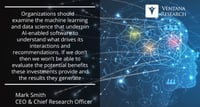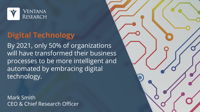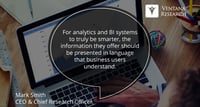Dreamforce has become the largest enterprise software event for businesses in the United States, and it is evident why when looking at it this year. With over 170,000 business and IT professionals attending, Salesforce came to show off upcoming product announcements and innovations. This year's biggest focus was on Einstein Voice (a personalized and intelligent conversational assistant), integration with other platforms, and Salesforce Customer 360. The last of these is the start of an answer...
Read More
Topics:
Salesforce.com,
Customer Experience,
Machine Learning,
Marketing,
Voice of the Customer,
CRM,
Dreamforce,
Sales Performance Management (SPM),
SPM,
Digital Technology,
Digital Marketing,
Robotic Process Automation,
AI,
natural language processing,
Intelligent CX
We now are well beyond the year depicted in 2001: A Space Odyssey, a cinematic perspective on the future of artificial intelligence in which HAL 9000, a computer, is able to simulate human behavior and control machines. Anyone reviewing the past two years of marketing around AI in the business technology industry can be forgiven for believing that we have arrived at the futuristic state Stanley Kubrick imagined. We have not.
Read More
Topics:
Big Data,
Data Science,
Mobile,
Customer Analytics,
Customer Engagement,
Customer Experience,
Machine Learning,
Mobile Technology,
Wearable Computing,
business intelligence,
Analytics,
Cloud Computing,
Collaboration,
Customer Service,
Data Governance,
Data Integration,
Data Preparation,
Internet of Things,
Contact Center,
Information Optimization,
Digital Technology,
Machine Learning and Cognitive Computing,
Cybersecurity,
Billing and Recurring Revenue,
Workforce Optimization,
collaboration for business
Advancing the potential of any business requires continuous improvement in the processes and technology that support it. Many companies have embraced attempts at a digital transformation, and it’s become a goal to which organizational resources and budgets have been dedicated around the globe.
Read More
Topics:
Big Data,
Data Science,
Mobile,
Sales,
Customer Analytics,
Customer Engagement,
Customer Experience,
Human Capital Management,
Machine Learning,
Marketing,
Marketing Performance Management,
Mobile Technology,
Office of Finance,
Wearable Computing,
Analytics,
Business Intelligence,
Cloud Computing,
Collaboration,
Customer Service,
Data Governance,
Data Integration,
Data Preparation,
Internet of Things,
Contact Center,
Information Optimization,
Product Information Management,
Digital Technology,
Digital Marketing,
Digital Commerce,
Operations & Supply Chain,
Machine Learning and Cognitive Computing,
Pricing and Promotion Management,
Cybersecurity,
Billing and Recurring Revenue,
Workforce Optimization,
collaboration for business
If we look at the focus of technology vendors for analytics and business intelligence or business applications providers deploying these capabilities in the last five years, we see that they have elevated the importance on the value of visualization and dashboards. These promotions might be understandable, but will they make business and the people using them more intelligent?
Read More
Topics:
Big Data,
Data Science,
Mobile,
Machine Learning,
Analytics,
Business Intelligence,
Cloud Computing,
Collaboration,
Digital Technology,
Machine Learning and Cognitive Computing
The importance of analytics for sales organizations is clear and, as I pointed out in my recent analyst perspective on the next generation of sales analytics, these capabilities optimize revenue potential. However, utilizing sales analytics requires a set of data skills that most organizations still find challenging and are thus not fully prepared to support. The efficient access and preparation of data underlies any analytics processes, which must meet demanding needs that are not always...
Read More
Topics:
Big Data,
Sales,
Machine Learning,
Office of Finance,
Analytics,
Cloud Computing,
Collaboration,
Product Information Management,
Sales Performance Management,
Digital Technology,
Digital Commerce,
Sales and Operations Planning,
Machine Learning and Cognitive Computing,
Sales Enablement and Execution,
Sales Planning and Analytics
Cloudera provides database and enabling technology for the big data market and overall for data and information management. As my colleague David Menninger has written, the big data and information management technology markets are changing rapidly and require vendors to adapt to them. Cloudera has grown significantly over the last decade and now has approximately 1,000 customers and provides support and services in countries around the world. Its product and technology strategy is to provide a...
Read More
Topics:
Big Data,
Data Science,
Machine Learning,
Analytics,
Business Intelligence,
Cloud Computing,
Data Governance,
Data Integration,
Data Preparation,
Internet of Things,
Cognitive Computing,
Information Optimization,
Digital Technology,
Cybersecurity
I am happy to provide my personal perspective on the potential of sales organizations, processes and technology to supercharge business activity in 2017. The sales processes of organizations – whether they involve digital commerce or direct or indirect physical selling – should be part of continuous optimization efforts to reach maximum results. To do this, the people leading and running sales processes must be able to use technology that supports their responsibilities and analyzes the crucial...
Read More
Topics:
Big Data,
Sales,
Machine Learning,
Mobile Technology,
Office of Finance,
Analytics,
Cloud Computing,
Collaboration,
Product Information Management,
Sales Performance Management,
Digital Technology,
Digital Commerce,
Operations & Supply Chain,
Sales and Operations Planning,
Machine Learning and Cognitive Computing,
Sales Enablement and Execution
IBM Watson blends existing and innovative technology into a new approach called cognitive computing. At the simplest operational level it is technology for asking natural language-based questions, getting answers and support appropriate action to be taken or provide information to make more informed decisions. The technology relies on massive processing power to yield probabilistic responses to user questions using sophisticated analytical algorithms. A cognitive system like Watson accesses...
Read More
Topics:
Big Data,
Machine Learning,
Operational Performance Management (OPM),
Business Analytics,
Business Intelligence,
IBM,
Business Performance Management (BPM),
Cognitive Computing,
Customer Performance Management (CPM),
Expert Systems,
Financial Performance Management (FPM),
IBM Watson,
Information Management (IM),
IT Performance Management (ITPM),
Sales Performance Management (SPM),
Supply Chain Performance Management (SCPM),
Workforce Performance Management (WPM)

















